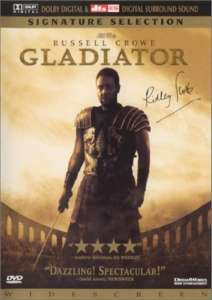| Plot |
| A big-budget summer epic with money to burn and a scale worthy of its golden Hollywood predecessors, Ridley Scott's Gladiator is a rousing, grisly, action-packed epic that takes moviemaking back to the Roman Empire via computer-generated visual effects. While not as fluid as the computer work done for, say, Titanic, it's an impressive achievement that will leave you marveling at the glory that was Rome, when you're not marveling at the glory that is Russell Crowe. Starring as the heroic general Maximus, Crowe firmly cements his star status both in terms of screen presence and acting chops, carrying the film on his decidedly non-computer-generated shoulders as he goes from brave general to wounded fugitive to stoic slave to gladiator hero. Gladiator's plot is a whirlwind of faux-Shakespearean machinations of death, betrayal, power plays, and secret identities (with lots of faux-Shakespearean dialogue ladled on to keep the proceedings appropriately "classical"), but it's all briskly shot, edited, and paced with a contemporary sensibility. Even the action scenes, somewhat muted but graphic in terms of implied violence and liberal bloodletting, are shot with a veracity that brings to mind--believe it or not--Saving Private Ryan, even if everyone is wearing a toga. As Crowe's nemesis, the evil emperor Commodus, Joaquin Phoenix chews scenery with authority, whether he's damning Maximus's popularity with the Roman mobs or lusting after his sister Lucilla (beautiful but distant Connie Nielsen); Oliver Reed, in his last role, hits the perfect notes of camp and gravitas as the slave owner who rescues Maximus from death and turns him into a coliseum star. Director Scott's visual flair is abundantly in evidence, with breathtaking shots and beautiful (albeit digital) landscapes, but it's Crowe's star power that will keep you in thrall--he's a true gladiator, worthy of his legendary status. Hail the conquering hero! --Mark Englehart |
|

